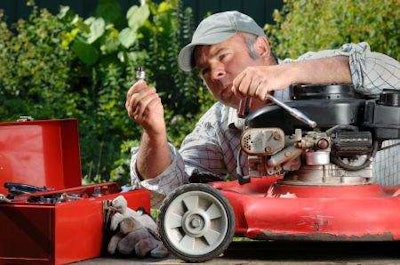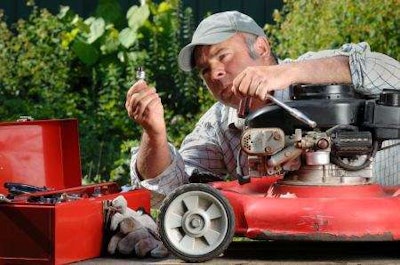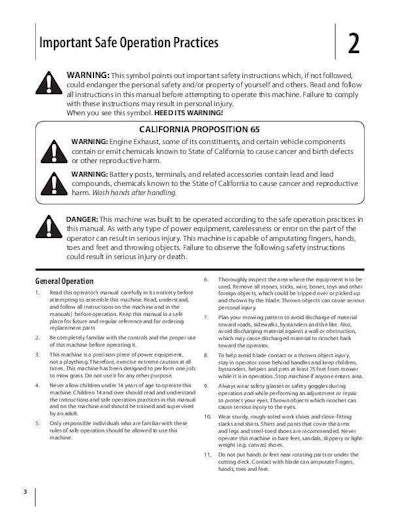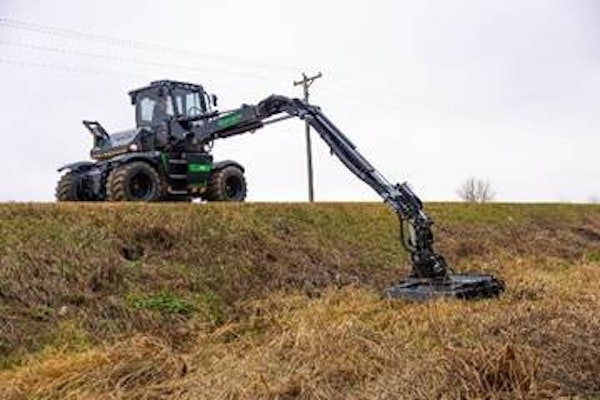

“Preventative maintenance is common sense,” says Lenny Mangnall, technical service manager with Exmark Manufacturing. “Not only will maintaining equipment throughout the busy mowing season provide high-quality results, but it will also add to the longevity of the machine’s engine and components and keep everyone safe.”
Mangnall offers contractors a few key maintenance tips to ensure lawn equipment continues to perform during spring, summer and fall mowing seasons.
Keep it clean
First and foremost, landscapers should keep equipment components and engines as clean as possible. A clean mower is easier to inspect for damage, and it runs more efficiently.
“Clean air, clean fuel and clean oil – those are the three big reminders I give to contractors about their mowers,” Mangnall says.
This includes changing the air filter and oil at regular intervals, checking that air-filter housing components are intact and using fuel that hasn’t degraded.
“I’ve talked to contractors who only begin to think about oil and filter changes when the manufacturer’s recommended service interval has already been reached,” Mangnall cites. “Don’t wait until the recommended interval, have the oil and filters changed before 100 hours, not after.”
Disregarding the recommended service intervals can seem harmless, especially with propane. But Mangnall says that’s not the case. “The oil comes out clean and light brown at 100 hours of use with propane, so there’s no doubt that the oil is much cleaner. But, extending your interval is never a good idea. Even though it appears clean, oil lubricity and viscosity degrades with use,” he says.
Landscapers using gasoline or diesel may need to monitor their fuel quality throughout the season as well. Conventional fuels can deteriorate and breakdown if stored for too long, unlike propane which doesn’t degrade and has an indefinite shelf life.
“Neglecting to use a stable fuel may result in damage to engine components,” Mangnall says, “One perk of propane is that it doesn’t go bad like gasoline and diesel, so contractors running propane-powered mowers don’t need to worry about ruining their fuel source after any length of storage.”
Inspect the equipment
Performing preventative maintenance can also reduce unnecessary costs. According to Mangnall, frequently inspecting the mower’s belt tension, blades, tires and deck setting can improve the ground speed, quality of cut and overall performance of the mower, as well as prevent costly repairs.
“It all comes back around. You can pay now or pay later, but you usually pay a lot more later on,” Mangnall cautions.
If performance is diminishing, it may be a sign that something is wrong with a component. Never let something small go unnoticed – it can result in additional work or costs that could have been avoided.
“Replacing even the smallest pivot belts can range from $50 to $150 and using a little grease once in a while can insulate contractors from that cost,” Mangnall explains. “Grease only costs a few cents, and it would be a shame for a contractor to pay $150 for a new belt when he could have spent mere minutes greasing, which would’ve saved the old one.”

In-season mower maintenance not only reduces costs and increases performance but also ensures the safety of the machine for operators and bystanders.
Mangnall recommends landscapers read the operator’s manual thoroughly and understand what specific maintenance and safety procedures and intervals are required for their machine, as each OEM differs. Contact a professional about the mower’s maintenance needs whenever it’s not addressed in the manual.
Mangnall instructs contractors to seek professional help if they’re unsure about any mower parts or features. “Having a professional handle the work may prevent you from potentially voiding a warranty or incorrectly altering the machine,” Mangnall says. “In addition, propane-powered equipment should be inspected regularly by a certified propane professional.”
Another critical safety check contractors should perform is inspecting Operator Presence Controls (OPC) while starting the machine. OPCs prevent operators from releasing the break or engaging the blade before they’re seated. If any of the controls fail or don’t seem to be functioning properly, the mower should not be used without further inspection.
All mowers – from propane-powered to gasoline- or diesel-fueled – require in-season maintenance and safety checks on a daily, weekly and monthly basis. Spending a few minutes each day can go a long way in maintaining excellent mower performance throughout the season.
“It’s easy to forget about or just ignore preventative maintenance during the peak mowing season, but in reality, that’s the most critical time,” Mangnall affirms. “Not only will it extend the life of the machine, but it also encourages safety and reduces downtime. That means more time spent mowing and adding to the bottom line.”
By Jeremy Wishart, senior programs manager, Propane Education & Research Council









